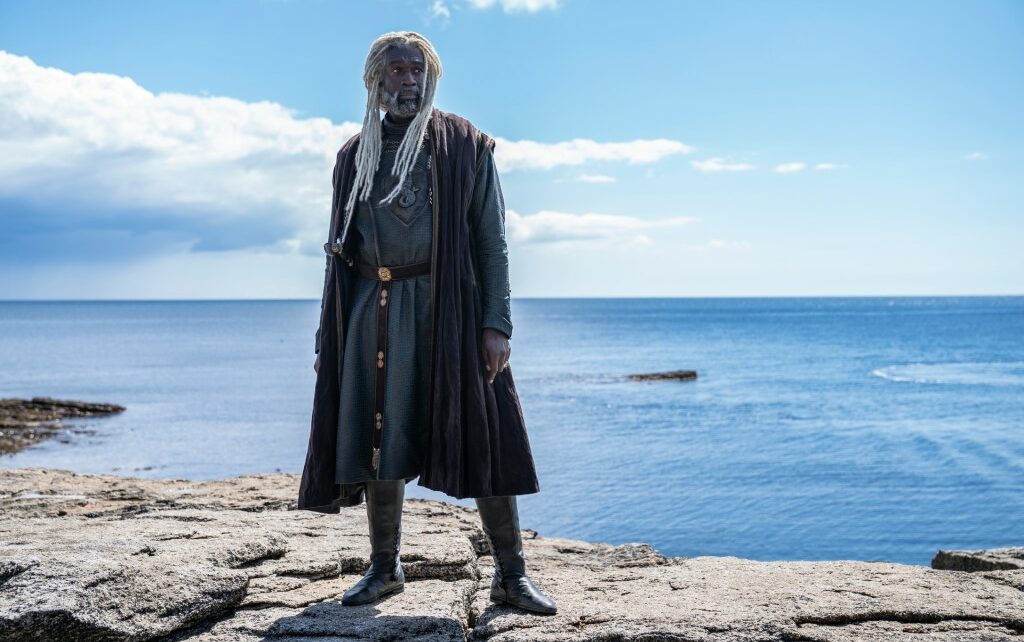From the majestic-but-aged environs inhabited by the British royals Netflix’s in “The Crown” and the decadent sun-drenched luxury of the San Domenico Palace resort in Taormina, Sicily, in HBO’s “The White Lotus” to the foreboding Ontario wilderness where a girls’ soccer team is stranded in Showtime’s “Yellowjackets,” the locations used in this year’s Emmy-nominated dramas loom so large they can be viewed as characters unto themselves that interact with the performers and help shape the narrative.
It’s especially true of the role Albuquerque, N.M., plays in AMC’s “Better Call Saul.” There’s no telling if the series would even exist if creator Vince Gilligan had gotten his way back in the mid-2000s and the studio suits at Sony agreed to let him use Riverside, Calif., as the setting for its predecessor “Breaking Bad” (2008-2013), which established the “Saul” characters and their dramatic universe.
“I’m glad we won’t know,” says “Better Call Saul” producer Melissa Bernstein. “I think Vince always wanted those visuals to jump off the screen and tell you what you’re watching, and I’m just not sure that could have happened [if it had been shot in Riverside]. And the last episode had so many locations in it, but we weren’t like, ‘We’ll just go back here and here.’ It was, ‘We have to figure out the next new puzzle.’”
One of the key puzzle pieces for the series finale, directed by co-creator Peter Gould, was the opening scene set in an otherwise barren spot in the desert with a stock tank and windmill, both of which had to be brought in for the shoot.
“We had to find a desert location that could fit in with what we had shot the prior season,” says Bernstein. “And then we had to understand that there was civilization in the next few miles, so it was suggesting some sort of relief.”
The “Better Call Saul” team also did time at the penitentiary of New Mexico in Santa Fe to shoot scenes set at the fictional penitentiary Montrose ADMAX in Montrose, Col., aka “The Alcatraz of the Rockies,” which required them to submit to the psychological equivalent of a full-body cavity search.
“The entire crew had to have background checks, and if anybody didn’t clear the background check, they couldn’t come in, and all the inventory that we were going to bring into the prison had to be submitted ahead of time and then they checked things at the gate,” says series location manager Christian Diaz de Bedoya.
While “Better Call Saul” was prized for its distinct identity, the producers of HBO’s “The Last of Us” adapted from the post-apocalyptic 2013 video game of the same name, chose Alberta, Canada, for its versatility. The Canadian province portrays 180 locations in the series, from Jackson, Wyo., to Kansas City to Boston.
“We had to get so many different architectural looks and landscapes, and the weather changes through all of the seasons, so we needed a place that accommodated all of that, and Alberta seemed tick off all the boxes,” says series co-executive producer Jacqueline Lesko.
The producers shot Alberta from bottom to top. At the southern border with Montana, they spent time at Waterton National Park, which portrayed a resort town where a group of characters settle in for a harsh winter in episode nine. On the northern side of the province, they shut down an entire main street in North Edmonton to create a bombed-out town for episode three. Production designer John Paino repainted and aged down Queen Elizabeth II Ambulatory Care Centre in Grande Prairie to stage the climactic hospital shootout in the season finale.

Bernstein says the biggest score was the Northland Village Mall in Calgary, featured in episode seven, “Left Behind.”
“We were on the hunt for a mall that we could kind of take over, which is impossible in a working mall because they’re open seven days a week,” explains Bernstein. “[Northland] was going defunct. I think there was maybe a couple stores open, but they pretty much said, ‘We’re going to tear this down. You guys can do whatever you want to it.’ And we were like, ‘Really?’ The biggest problem with that was it was a one-story mall and we needed two stories, and that’s where visual effects stepped in.”
A series about a zombie-ravaged wasteland doesn’t seem like a good bet to inspire tourism, but Tannis Gaffney, senior VP and chief marketing officer for Travel Alberta, has seen anecdotal evidence it’s already happening.
“I was doing an interview with one of our TV networks on the Canmore Engine Bridge, and a couple walked past us and asked if this was the bridge in episode four because they’d flown from Brazil to see it,” says Gaffney.
In HBO’s prequel series “House of the Dragon,” production designer Jim Clay took locations that were already popular tourist sites and adapted them to the needs of the otherworldly fantasy, set 200 years before the events in “Game of Thrones.”
Although the production was based in England, many of the locales used were in Spain, giving Clay a look that tied into the Reed Keep in “Game of Thrones” — played by Fort Lovrijenac, an 11th-century limestone structure in Dubrovnik, Croatia, perched atop a 37-meter-high rock overlooking the Adriatic Sea — but with a feel that was slightly more Byzantine or Moorish.
“There’s a kind of distinct look about U.K. medieval,” observes Clay. “It’s a heavier sort of architecture. Once you’re into Spain or obviously Italy, there’s much more of this sort of Renaissance, slightly more romantic, slightly more detailed feel to the architecture.”
Spanish locations used in “House of Dragons” include the Italian Renaissance-style Santa Clotilde Gardens in Lloret de Mar, the 16th-century castle of La Calahorra in Granada, and the town of Trujillo, which boasts a mix of Roman, Islamic and Christian-influenced architecture.
Clay’s favorite was the city of Cáceres, a UNESCO World Heritage Site in west-central Spain founded by the Romans in 25 B.C. The only downside was that it was a bit too clean.
“Obviously, we can’t change the stonework, but the authorities cooperated as much as they could and we were able to put a ground covering throughout all of the streets,” says Clay. “That was partly for the look, and it was partly for horses being able to maneuver over wet cobblestones without tripping.”
TV shows can alter landscapes in more significant ways. Even the biggest tentpole movie is little more than a visiting circus that will disappear with nary a trace after a month or two. On the other hand, a long-running series can build and sustain a production community, and “Breaking Bad” and “Better Call Saul” have done that in New Mexico almost as much as the tax credit brought the producers there back in 2007. And it’s also built a thriving tourism trade that includes “Breaking Bad” RV tours of Albuquerque and bronze statues of Walter White (Bryan Cranston) and Jesse Pinkman (Aaron Paul) at the city’s convention center.
“These two series undoubtedly cultivated and fostered our highly skilled crew base, employing thousands of New Mexicans, from actors and grips, to caterers, drivers, and more,” says Amber Dodson, New Mexico Film Office director. “A lot of New Mexicans cut their teeth on these shows, and are now department heads and producers themselves.”
Read More About:
Source: Read Full Article

